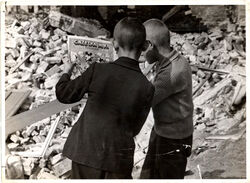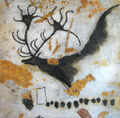Comics (nonfiction): Difference between revisions
Jump to navigation
Jump to search
No edit summary |
|||
| Line 14: | Line 14: | ||
File:Jesse_Orion_40pitd020.png|''40 Peanuts in the Desert'' by Jesse Orion points the way. | File:Jesse_Orion_40pitd020.png|''40 Peanuts in the Desert'' by Jesse Orion points the way. | ||
File:Manga_Hokusai.jpg|Hello World, says Manga Hokusai. | File:Manga_Hokusai.jpg|Hello World, says Manga Hokusai. | ||
File:Approved_by_the_Comics_Code_Authority.gif|link=Comics Code Authority (nonfiction)|[[Comics Code Authority (nonfiction)|Comics Code Authorial symbol]] unemployed, will assert censorship authority for food. | |||
</gallery> | </gallery> | ||
Revision as of 08:50, 17 June 2016
Comics frequently takes the form of juxtaposed sequences of panels of images. Often textual devices such as speech balloons, captions, cartouches, and onomatopoeia indicate dialogue, narration, sound effects, or other information. Size and arrangement of panels contribute to narrative pacing.
Since the late 20th century, bound volumes such as graphic novels, comics albums, and tankōbon have become increasingly common, and online webcomics have proliferated in the 21st century.
Scholars have posited a pre-history as far back as the Lascaux cave paintings.
In the News
Harvesting Algorithmic speech balloons from freshly enumerated Diagramaceous soil.
Comics Code Authorial symbol unemployed, will assert censorship authority for food.
Fiction cross-reference
Nonfiction cross-reference
External links:





